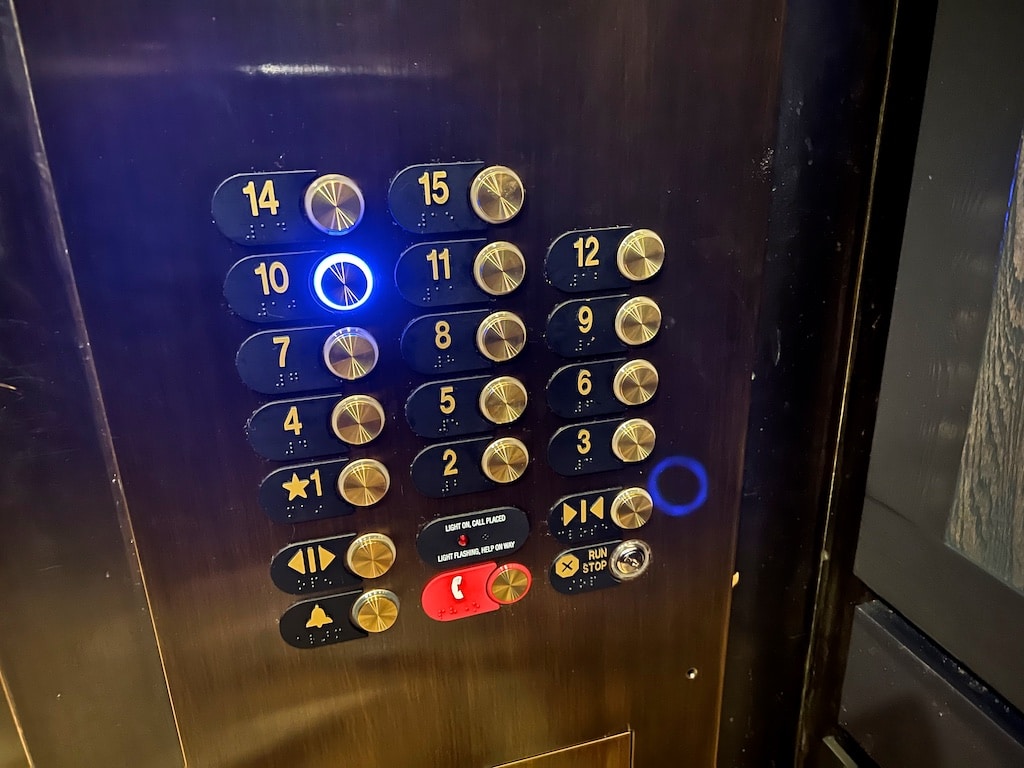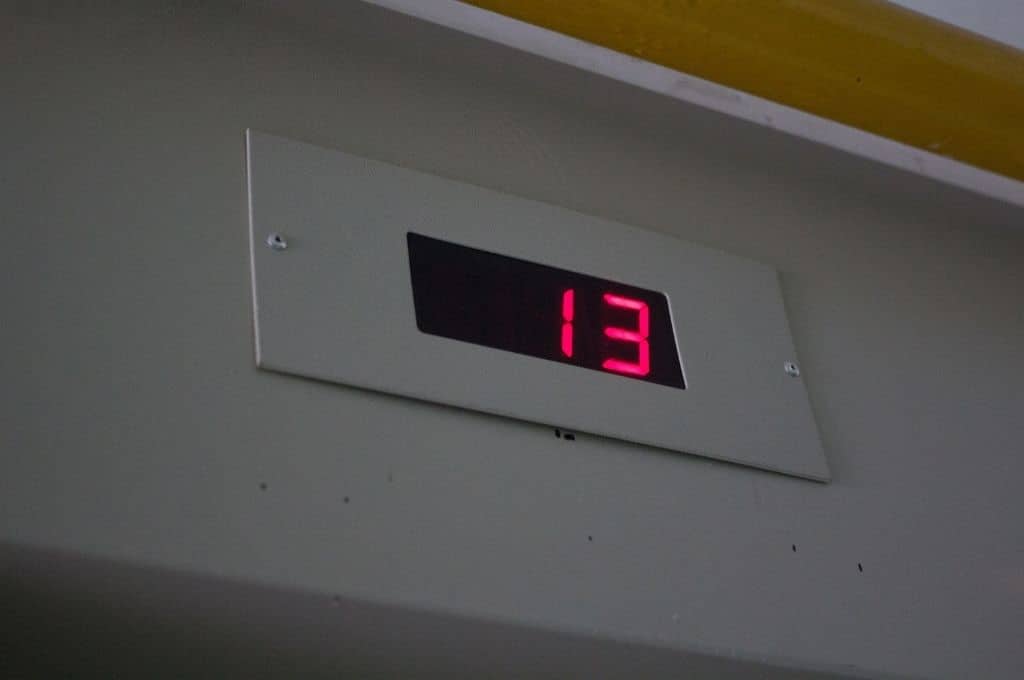You may have been on a hotel elevator before and noticed that there was no button for the 13th floor.
Or, maybe you are like a lot of hotel guests and you’ve never paid attention to the numbers on the elevator panel.
Either way, believe it or not a lot of hotels try to avoid having a (named) 13th floor and sometimes even avoid having rooms with the number 13.
In this article, I’ll break down why some hotels have a missing 13th floor and what some properties are doing as an alternative.
Table of Contents
Why do hotels not have a 13th floor?
Many hotels do not have a 13th floor because a sizable segment of the US population does not want to stay in a room on the 13th floor due to phobias or superstitious beliefs. (A lot of “unfortunate” historical or mythological events involved the number 13). So by not having a named 13th floor, hotels can avoid issues with these guests and attract more potential customers.
To remedy the issue, some hotels just call the 13th floor the 14th floor, or they use it for storage and utility purposes. Often times you will not see the number 13 in a hotel elevator because of this but it’s worth noting that 13 is not an unlucky number in every country.
Tip: Use the free app WalletFlo to help you travel the world for free by finding the best travel credit cards and promotions!

How many hotels don’t have a 13th floor?
There may not be exact data on how many hotels don’t have a 13th floor but the Otis Elevators company estimates that “85% of the buildings with their elevators do not have a named 13th floor.“
That’s a very significant number and so I would expect that many, if not most hotels in the US, may not have a named 13th floor.
In fact, this number is backed up by the Stress Management Center and Phobia Institute in Asheville, North Carolina, which states that over 80% of high-rise buildings in the US do not have a 13th floor.
When it comes to missing 13th floors it’s not just hotels either.
You can commonly find missing 13th floors in hospitals and missing gate 13s in airports.

How bothered are hotel guests by the 13th floor?
According to a 2007 Gallup poll, 13% of Americans reported that they would be bothered if given a hotel room on the 13th floor.
Also, close to 10% indicated that they would be so bothered that they would actually request a room on a different floor.
(Women were more than twice as likely as men to say they would be bothered.)
It almost seems too coincidental that 13% happened to be the number of Americans that would be bothered but there could be a pretty legitimate and somewhat serious reason for why so many people would be troubled.
It’s called triskaidekaphobia: which is essentially a phobia of the number 13.
Triskaidekaphobia is a legit phobia and can cause symptoms like persistent feelings of fear or anxiety.
It seems to affect about 10% of the population. That number appears to be in line with the 2007 Gallup poll which would explain why about a 10th of the population would request to be moved to a room not on the 13th floor.
Having about 10% of your guests affected by something probably does not seem like a large enough segment to cause such a “drastic” action as removing a floor.
But from the eyes of a hotel owner, you could see it as optimizing sales for ~10% of potential customers with the simple and cheap solution of replacing a hotel button.
So from that perspective it makes a lot of sense that you would not see a named 13th floor in a lot of hotels or residential buildings.
Related: Why Hotel Rooms Have Bibles & Why That’s Changing

Why the number 13 is closely linked to superstition
So why exactly would the number 13 be so problematic for so many people?
The answer is probably that there are just a lot of “unfortunate” historical or mythological events involving the number 13.
These have been passed down for centuries with each iteration only strengthening the connection between 13 and negative outcomes.
Let’s take a look at some of the most well-known events linked to the number 13 being unlucky or a sign of bad things to come.
Ancient Babylon’s Code of Hammurabi
The Ancient Babylon’s Code of Hammurabi (which is the best-preserved legal text from the ancient Near East and dates back to 1700 BC) may have played a big role in shaping how we view the number 13.
The code left out the number 13 from its laws, which may have caused people to worry about why that was the case.
It was later reported that this was due to a clerical error but the foundation for being suspicious about all things 13-related may have already been created.
Loki
Norse mythology may also be one of the earliest sources to trace back a fear of the number 13 and it all starts with Loki.
According to Nowegian American:
Apparently twelve deities sat down for a meal at a gods’ feast only to have Loki, the god of mischief and disorder, come along and crash the party. He rose the number to thirteen, causing one of the gods to die during the meal.”
Judas Iscariot
At the Last Supper Judas Iscariot came along as the 13th guest and ended up betraying Jesus for 30 pieces of silver, ultimately leading to Jesus’ crucifixion.
The story mirrors the Loki story and likely drilled home the superstition between the connection of imminent death and having 13 guests for a meal.
12 is a perfect number
Some societies have thought as 12 as a type of “perfect” number.
There are 12 months in the year, 12 days of Christmas, 12 zodiac signs, 12 tribes of Israel, etc.
So naturally (to many people), when 13 rolls around it offsets the perfect established balance of 12 and is therefore problematic.
Friday the 13th
There’s some speculation on how exactly Friday the 13th came about.
Some link it to roots in Christianity with Friday being the day Jesus was crucified or even the day Adam gave Eve the forbidden fruit.
But it seems that the unlucky association between Friday and the 13th became more of an issue in the early 1900s in connection to Wall Street and the stock market.
The superstition likely steadily grew over time through the decades and then really took off with the movie Friday the 13th in 1980.
The emergence of superstition around Friday the 13th probably only bolstered the superstitious beliefs related to all things 13, including the bad luck involved in staying on the 13th floor.
Modern tragedies
People looking to modern tragedies can point to a number of coincidences involving the number of 13.
For example, princess Diana died at the 13th pillar of the Pont de l’Alma tunnel.
The space shuttle Columbia disaster occurred on the 113th flight of the shuttle (which seems like an awful lot of flights).
More than likely, it’s just a fact that tragedies always have happened and will continue to happen and some of them will occur in such away that somehow relates to the number 13.
Nevertheless, for some people these coincidences will only strengthen the superstition that 13 should be avoided and add more fuel to the fire for hotel owners to avoid having a 13th floor.
Related: Hidden Cameras In Hotel Rooms!? Tools To Find Them & Where To Look

Beginnings of skyscrapers
It’s clear that there are a lot of different ways superstition is tethered to the number 13.
But when was the connection made to high-rises and then to hotels?
It doesn’t seem like history offers us a clear answer but we do have an idea of how it came about.
The world’s first skyscraper (the Home Insurance Building in Chicago) did not come on the scene until 1885.
This building was 138 feet tall and had a total of 10 stories which was crazy tall at the time (it was later raised to 12 stories in 1891).
The idea of building taller buildings, and buildings that would reach to the 13th story and beyond made some people weary (but for practical reasons).
They thought that the tall buildings would cast huge shadows across the city that would be unsightly and deprive city dwellers of much-needed sunshine.
The high-rises could also contribute to more congestion and cause property values to plummet.
Then there was probably the issue of fires.
The great Chicago fire in 1871 was probably still on the minds of many people with respect to city building.
Those reasons may have slowed down the pursuit of a 13th+ floor but it was clear that at the time (the late 1800s) there was already considerable superstition swirling around the number 13.
For example, this was same time that the Thirteen Club came into existence (1881) in an effort to get rid of the superstition around the number 13.
You could imagine people thinking: If a fire were to randomly break out in a high-rise building, what floor would be the most likely candidate?
So testing the building limits while sprinkling in a little bit of 13th floor voodoo that could scare off customers was probably not high on the priority list for high-rise developers.
When developers finally decided to exceed 13 floors it was probably the deep rooted fear of the number 13 — that had been passed down for centuries — that laid the groundwork for avoiding the 13th floor in the future altogether.
Alternatives to the 13th floor
So if a hotel does not want to have a 13th floor, what exactly do they do?
They have a few different options and I’ll describe each one below.
Skipping the 13th floor
The most common method for dealing with the number 13 problem is to simply skip it on the elevator panel.
This means that if you looked at an elevator you would simply see:
11, 12, 14, 15…
If you were to get off on the 14th floor, that would actually be the 13th story of the building, so there is still a 13th floor but it is just not “named.” For many people that is good enough.
However, altering labels for floor levels could make things difficult for first responders which is one reason why some areas have banned the practice.
Renumbered 13th floor
Some properties will simply re-number or rename the 13th floor.
At these properties, you might see something like:
11, 12, 12A, 14, 15…
Or you could see:
11, 12, 14A, 14, 15.
They could also use the letter “M” which happens to be the 13th letter of the Latin alphabet and also could stand for something like “mechanical floor” or “maintenance floor.”
Empty 13th floor
A hotel that is very serious about the 13th floor superstition might leave the entire floor empty.
Or more likely, it could be used for things like storage or mechanical use and perhaps accessed from a special maintenance elevator or staircase.
Unlucky numbers in other cultures
If you visit other destinations around the world, they don’t treat 13 the same way.
In fact, 13 could actually be a lucky number in some cultures, such as with the ancient Egyptians or perhaps even in Italy.
Other numbers could be problematic, though.
For example, in Asia, certain countries like China treat the number four similar to how the West treats 13.
The number four sounds very similar to death and hotels will actually try to avoid the number for as much as possible in certain locations (a tough gig for Four Seasons hotels).
Final word
For centuries, there has been superstition around the number 13.
There are multiple reasons why that might be the case but at the end of the day it seems like there is just something about that number that rubs people the wrong way.
When it comes to hotels, many properties want to accommodate as many guests as they can and because a sizable percentage of the population has an issue with staying in a room on the 13th floor, many hotels have taken measures to avoid having a named 13th floor.
Daniel Gillaspia is the Founder of UponArriving.com and the credit card app, WalletFlo. He is a former attorney turned travel expert covering destinations along with TSA, airline, and hotel policies. Since 2014, his content has been featured in publications such as National Geographic, Smithsonian Magazine, and CNBC. Read my bio.



I enjoyed reading this article. I stop by your site frequently because of its nitty-gritty, practical travel advice, most of it stuff I would take forever to learn on my own. However I also love the entertaining, almost random knowledge you share, as in this post. Your blog is never boring.